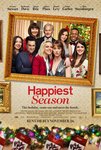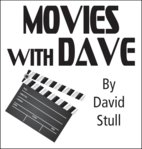It’s beginning to look a lot like Christmas, at least film wise.
I feel like I had my pick of the litter when it comes to movies this week. There were so many to choose from, I had a hard time …
This item is available in full to subscribers.
To continue reading, you will need to either log in to your subscriber account, below, or purchase a new subscription.
Please log in to continue |



It’s beginning to look a lot like Christmas, at least film wise.
I feel like I had my pick of the litter when it comes to movies this week. There were so many to choose from, I had a hard time narrowing down which two I wanted to cover.
Netflix just released their sequel to their popular holiday film “The Christmas Chronicles,” featuring Kurt Russell as Santa Claus.
Amazon just came out with a new film called “Uncle Frank,” featuring Paul Bettany and Sophia Lillis, one of the breakout stars from “It.”
Disney+ made a remake of “Black Beauty,” starring Kate Winslet as the horse, so you know that’s gotta be fun.
Then there’s “The Personal History of David Copperfield,” which was one of the few films to come out in theaters back in August, but has recently made its way to video-on-demand. The trailers for that film looked great.
In the end though, I settled on the latest movie from filmmaker Ron Howard, featuring the talents of Amy Adams and Glenn Close. Can’t go wrong with that, right? I’m definitely not foreshadowing anything here.
And because I prefer my movies in twos, I also saw a romantic comedy about a couple visiting family over the holidays. The twist? They’re both women, and their family doesn’t know they’re gay.
Sound like fun? Then let’s get right into the reviews.
***
First up is “Hillbilly Elegy.”
Based on the bestselling memoir of the same name, this film is a modern exploration of the American Dream and three generations of an Appalachian family as told by its youngest member, J.D. Vance (Gabriel Basso), a Yale Law student forced to return to his hometown.
Jeez, where do I even begin with this one?
I guess I’ll be up front right from the get-go.
I hated this movie.
I didn’t just dislike the film. I actively despised it.
It’s been a long time since I’ve watched a movie that has made me quite this angry.
This is especially disappointing considering the film’s pedigree. On the surface it seems like it has a lot going for it.
The movie features two Oscar nominated stars, Amy Adams and Glenn Close, both of whom are incredibly talented actresses.
The story is based on a popular memoir, focused on a group of people often overlooked by filmmakers.
And to top it all off, the movie is directed by acclaimed filmmaker, and everyone’s favorite child actor of the 60s, Ron Howard.
So what’s my issue with it?
Well, it’s with the story itself, or at least the way it’s presented. I haven’t read the book that this film is based on, but I imagine the story could have been framed in a way that didn’t make me want to pull my hair out.
For whatever reason, the people behind this movie decided they wanted to spend the majority of the film’s runtime focusing on J.D.’s mother Bev, played by Amy Adams.
That sounds pleasant, right? A story showing the relationship between a mother and son, both with him as a child and as a man later in life. I’m sure they’ll have their differences and both of them will have emotional issues to overcome, but in theory it should be a pleasant and rewarding story to see unfold.
If only.
I’m not sure what the real Beverly Vance is like. For all I know she could be a perfectly pleasant person now. That said, this movie portrays her as a selfish, ungrateful, good for nothing psychopath.
She’s completely manic and starts pointless arguments at the drop of a hat.
Plus, she actually threatens to murder her son at one point. I’m not talking about her kidding around, or jokingly saying something like “I brought you into this world, I can take you out.”
Again, if only.
While Bev is driving away from J.D.’s favorite store, a business where Bev happens to get her and her son kicked out of after behaving like a complete jackass, Bev is set off once again by a comment from one J.D’s friends that he repeats, and she decides to start going double the speed limit, swerving in and out of the right hand lane, while saying “I could crash and I could kill us.”
Then, after finally stopping, she has the nerve to say “You really thought I was gonna kill us?” Yes, yes he did you crazy person. You verbally threatened to kill him and you acted like you were going to kill him. What the heck do you expect?
But it doesn’t end there. Oh no.
Bev has to keep escalating things further. J.D. runs from the car, after, you know, his mom threatens to murder him, seeks shelter in a nearby house and calls his Mamaw (Glenn Close) to come pick him up. The local resident wisely decides to call the police.
That naturally doesn’t stop Bev from breaking into the house and assaulting the woman living there in the process.
Of course when the police arrive, J.D. lies to them and says his mom didn’t do anything. This earns J.D. praise from his family, and enables Bev to continue being a terrible mother and horrible human being in general.
Did I mention that this scene was framed as a flashback, and this is all being shown while J.D. is driving to Ohio to deal with his mother after she overdoses on heroin? So we know right up front that Bev doesn’t get any better in the span of 14 years.
In fact, Bev is just as insufferable over a decade later. She refuses to get help, and anytime J.D. tries to help her she outright refuses in the most ungrateful and verbally abusive way possible.
There’s no signs of Bev being a decent person anywhere in this movie. There’s nothing redeemable about her at all. She’s just a manic, abusive, drug addict mother who is continually enabled by family.
I was so angry at her character. And to be frank, I was pretty upset by the rest of her family too. I don’t think I’ve ever yelled in frustration this much while watching any form of media. It was so bad that by the end of the movie I think my throat was sore.
The worst part of it all for me though is that this movie tries to frame it all as just what country bumpkins deal with in their day-to-day family lives. That being family means we have to be there for each other, even if one of us continually tries to set their life on fire.
To damnation with that. If anyone in my family treated me like Bev treats J.D., I would cut them out of my life completely. Obviously not as a kid, but I choose to be around people I like as an adult.
You know why I personally still enjoy spending time with my parents? Because they’re good people and I enjoy being around them. We have our differences, but we respect each other and we’re there for each other when we need support.
I don’t have an obligation to care for them just because we’re related. I care for them because they’ve shown time and time again that they care for me. Unlike Bev in this film, who is only shown to care about herself.
Perhaps in real life J.D. and Bev had more good times than bad. I can’t speak to that. As for the film, it focuses on nothing but the petty squabbles and the actions of an unhinged mother who’s hellbent on abusing her own flesh and blood.
As a final slap to the face, the movie ends on a hackneyed platitude about how your family makes you who you are and that your relatives are a part of you and anything you accomplish in life.
While that is true to a certain extent for many people, it’s very clear to me that the J.D. in the film is who he is despite his parentage, not because of it. Bev doesn’t get to claim credit for her son turning out fine when she spent his entire childhood being a terrible mother. That’s absurd.
It’s feel-good nonsense tacked onto the end of a non-stop shouting match between Bev and everyone else she encounters.
Why this film couldn’t focus more on J.D.’s relationship with his Mamaw, or even J.D.’s relationship as an adult with his girlfriend (Freida Pinto), I’ll never know.
His Mamaw was far from perfect either, but at least she tries to be a good grandparent to him.
Some of the best moments in the film are when she’s trying her best to course correct J.D. and help steer him down a better path. It’s tough love, but at least it’s love. And it’s miles beyond anything his own mother ever shows him.
If the moral of this story is that your family makes you who you are, then focus on the person who actually made a difference in our main character’s life.
But no, instead we have to be continually subjected to Bev’s tantrums.
I swear, this movie is nothing but an exercise in frustration.
Sure, the performances are good. In fact, they’re so good I think it’s gonna put me off of watching Amy Adams movies for a little while. I truly hated her character in this film.
And that’s simply due to bad storytelling. Instead of characters with depth, we’re given caricatures and melodrama.
I think the most disturbing thing about the experience of “Hillbilly Elegy” for me was not the film itself, but some of the user reviews I read about the movie after watching it. I saw far, far too many people claiming that they found this film, and the family in it, relatable.
If you’re relatives are anything like the characters in this movie, you have my deepest sympathies.
This is not how people should behave. You don’t deserve abuse. Get help and get away if you can.
To everyone else, please just don’t watch this movie. It’s not worth the aggravation or the high blood pressure that comes with it.
“Hillbilly Elegy” is rated R and is available to stream on Netflix.
***
The other movie this week is “Happiest Season.”
Meeting your girlfriend’s family for the first time can be tough. Planning to propose at her family’s annual Christmas dinner when they don’t even know she’s gay is even harder.
When Abby (Kristen Stewart) learns that Harper (Mackenzie Davis) has kept their relationship a secret from her family, she begins to question the girlfriend she thought she knew, putting their holiday plans, and their relationship, in jeopardy.
Yes, this movie is exactly what it sounds like.
It’s yet another corny holiday romcom. One of the many that seem to inevitably rear their overly sweet heads this time of year
Of course the twist here is, instead of starring a hetrosexual couple, as is the case in just about every romantic ever made movie, this film features a pair of women in love.
Frankly, I welcome the change of pace.
Afterall, according to Gallup, 4.5% of Americans identify as LGBT. I seriously doubt there’s been anywhere close to that high of a percentage of romantic movies made featuring gay couples over the years. So it’s nice to see the love spread around a little, figuratively speaking.
Beyond the obvious deviation, this film very much presents the typical trappings you’d expect in a holiday movie such as this.
The story here is incredibly predictable, to a fault. There’s very few surprises here, and the narrative beats come and go pretty much exactly as you might expect them to.
Abby and Harper go to Harper’s parents’ house for Christmas, but instead of Harper introducing Abby to them as her longtime girlfriend, she tells her family that Abby is her roommate.
This leads to a number of awkward scenarios, a few comedic moments, and a rising tension between our two leading ladies.
It’s easy to see both sides of the conflict here.
If you’re Abby, you feel abandoned by this person, who you thought loved you, when they continually hide you, and your relationship with them from their own family. After months of being together, it must feel like a betrayal.
Of course in Harper’s case, it can be just as difficult. With a family like her’s, fairly conservative and focused on nothing but appearances, there would be a huge amount of dread involved in even thinking about coming out of the closet.
Her parents’ negative attitudes towards gay relationships, while not outright hateful, are harmful nonetheless, and have lead Harper to hold an enormous amount of shame over her head. All for just being who she is.
That said, if there’s an antagonist here, it’s the casual homophobia that’s still pervasive in society even to this day. Harper’s parents, and indeed her entire family, really do mean well. They’re just oblivious to how toxic their behavior really is.
But enough about the message, it’s the characters that really make or break a romantic movie for me. Luckily both Kristen Stewart and Mackenzie Davis are up to the task here.
These two women really are adorable together. They have a natural chemistry right from the very beginning and their collective charisma really goes a long way in making this film the enjoyable experience that it is.
Honestly, I just can’t get enough of Mackenzie Davis these days. Even when the movie is terrible, as was the case of “The Turning” from earlier this year, Mackenzie is still knocking it out of the park.
If any of you haven’t seen “Tully,” the 2018 film about motherhood where she stars alongside Charlize Theron, you’re missing out.
Anyway, I guess I’ve pretty much covered the “romance” side of this romcom. I probably should touch on the comedy as well.
While I’m not always the biggest fan of the comedic aspect of romantic comedies, I actually found myself laughing quite a bit during this movie.
Sure, a few jokes are a little too on the nose for my taste, and some of the humor fell flat on occasion, but for the most part I had a pretty fun time.
It certainly was one of the funnier romcoms I’ve watched in recent memory, though naturally everyone’s sense of humor is a little different.
From my perspective though, this movie just about checks every box you could hope for with a holiday romantic comedy.
It has a fun, charismatic lead couple, a lighthearted story that knows just when to pull on your heartstrings, and just enough funny moments to keep you smiling throughout.
At the end of the day, what more can you ask for?
“Happiest Season” is rated PG-13 and is available to stream on Hulu.
Comments
No comments on this item Please log in to comment by clicking here